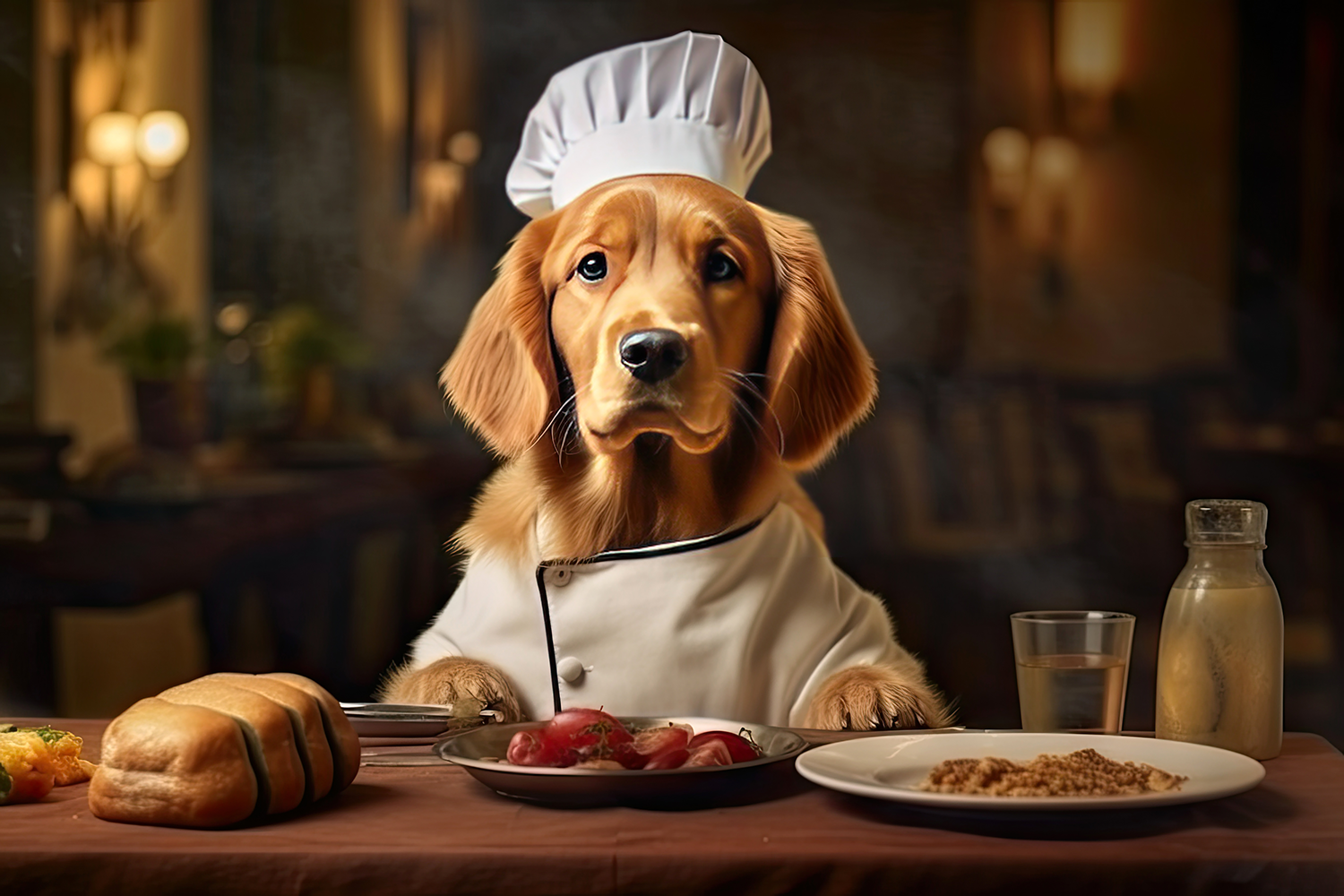How Does Your Dog Know When It's Time For Dinner?
Learn more about how dogs develop an uncanny sense of time, what cues they pick up on, and how evolution plays a role in their dinner anticipation.

My dog has an uncanny and precise sense of exactly when it's time for their dinner. I am often working away at my keyboard, oblivious to the fact that its her dinner time, but she gives me a gentle reminder every day by touching me with her paw and giving me a look. I check the clock and sure enough, its 5pm on the nose! My dog couldn't tell you the time, but she somehow knows exactly when its time for dinner, and when it's time to go for a walk. I could set my clock by her.
But how does she know?
Internal Doggy Clocks
Dogs, like many other animals, have an internal clock or circadian rhythm that helps them track the passage of time. This internal clock influences various aspects of their behavior and physiology, including their sleep patterns, activity levels, and, yes, their mealtimes. This internal clock, also known as the circadian rhythm, is regulated by the suprachiasmatic nucleus (SCN) in the dog's brain. The SCN is highly sensitive to light and dark cycles, which helps regulate the dog's sleep-wake patterns and other daily activities. It is this mechanism that allows your dog to know when it's time to eat or go out for a walk.
But perhaps your dog isn't a timekeeping genius who is as precise as your clock, there are still lots of other ways that your dog can figure out the time.
Scent and Appetite
One of the primary cues that signal dinnertime for your dog is the aroma of food. Dogs have an incredibly keen sense of smell, and even if you think you're being discreet in the kitchen, your dog can often detect the scent of food from afar. This acute olfactory sense plays a significant role in their ability to anticipate meals.
As you prepare their meal, your dog may pick up on the smell of their food, and this signals to them that something delicious is on its way. The anticipation of a tasty meal can cause them to become excited and start displaying behaviors associated with mealtime. Of course, my dog tells me its her dinner time, and if I try to give her her breakfast or dinner when its not the right time she won't eat it.
Routine and Pavlovian Conditioning
Dogs thrive on routine and predictability. They are excellent at recognizing patterns and associating them with specific events. When you feed your dog at the same time, you create a schedule that your dog can learn and anticipate.
This process is similar to Pavlovian conditioning, where dogs learn to associate a particular stimulus with an event. In this case, the stimulus is the time of day, and the event is dinner. Over time, your dog becomes conditioned to expect food at a particular hour, and their behavior will reflect this anticipation.
Physical Activity and Energy Levels
Another cue that dogs use to determine when it's time for dinner is their energy levels. As the day progresses, your dog expends energy through play, walks, and various activities. By the time it's nearing dinnertime, your dog might have burned off a significant amount of energy and become hungry. They may display restlessness or increased activity as they feel the need to refuel. This is particularly noticeable in active breeds or young dogs who burn through energy quickly. Their increased physical activity can serve as a clear indicator that dinnertime is approaching, and their tummy starts rumbling.
Human Behavior and Signals
Dogs are exceptionally attuned to human behavior and body language. They can pick up on subtle cues that signal mealtime, even before you start preparing their food. For instance, if you have a daily routine of feeding your dog at a specific time, they will notice your actions leading up to that moment. Your dog might notice you checking the clock, reaching for their food bowl, or heading to the kitchen. These actions become signals that dinner is on its way. The simple act of putting on an apron or opening the pantry where you store their food can trigger their anticipation. Like little detectives, they can work it out!
Barking the Dinner Bell
Dogs also communicate their hunger and anticipation through vocalizations. You've probably noticed that your dog may bark or whine as dinner approaches. This behavior is not only an expression of their excitement but also a way of getting your attention. By barking or whining, they hope to remind you that it's time to feed them. These vocalizations are often conditioned behaviors. Your dog has learned that when they bark or whine, you respond by feeding them. This creates a positive feedback loop that reinforces their anticipation of dinner through vocalization.
Natural Evolutionary Behavior
Understanding why dogs anticipate dinner is not only about their internal clock and conditioning; it's also rooted in their evolutionary history. In the wild, dogs are scavengers and opportunistic feeders. This means that they are always alert to the possibility of a meal, and they are ready to eat when food becomes available. In a domestic setting, this evolutionary behavior is translated into their anticipation of regular mealtimes. They are hardwired to be ready to eat when food is offered, just as they would have been in a pack or family group in the wild.
The Ritual of Dinner Time
For many dog owners, dinnertime is more than just providing sustenance; it's a daily ritual that strengthens the bond between human and canine. Dogs are social animals, and they thrive on routine and companionship. This is why they often look forward to the social aspect of dinner time as much as the food itself. When it's time for dinner, your dog not only anticipates the meal but also the interaction and connection with you. They see dinnertime as an opportunity to be close to their human family and share in the social experience.
The phenomenon of a dog knowing when it's time for dinner is a fascinating blend of biology, behavior, and evolution. Dogs have a remarkable internal clock, an acute sense of smell, and a talent for recognizing patterns and cues. Over time, they become conditioned to expect dinner at a specific hour and will eagerly display their excitement and anticipation. Understanding your dog's ability to anticipate dinner is a testament to their intelligence and adaptability.
It's a reminder of the strong bond that exists between humans and their canine companions. So, the next time your dog seems to know precisely when it's time to eat, remember that it's not just about the food; it's also about the shared experience and the connection between you and your furry friend.
If you think I missed anything, or have any funny stories about your dog knowing that time it is, let me know in the comments below!


